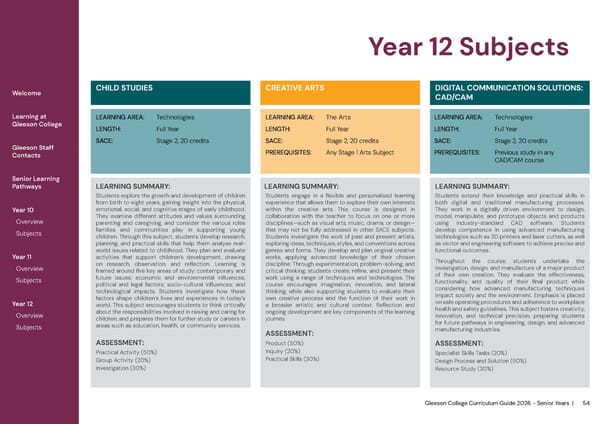Gleeson College Curriculum Guide 2026 - Senior Years | 54 Year 12 Subjects Welcome Learning at Gleeson College Gleeson Staff Contacts Senior Learning Pathways Year 10 Overview Subjects Year 11 Overview Subjects Year 12 Overview Subjects LEARNING SUMMARY: Students explore the growth and development of children from birth to eight years, gaining insight into the physical, emotional, social, and cognitive stages of early childhood. They examine different attitudes and values surrounding parenting and caregiving, and consider the various roles families and communities play in supporting young children. Through this subject, students develop research, planning, and practical skills that help them analyse real- world issues related to childhood. They plan and evaluate activities that support children’s development, drawing on research, observation, and reflection. Learning is framed around five key areas of study: contemporary and future issues; economic and environmental influences; political and legal factors; socio-cultural influences; and technological impacts. Students investigate how these factors shape children’s lives and experiences in today’s world. This subject encourages students to think critically about the responsibilities involved in raising and caring for children, and prepares them for further study or careers in areas such as education, health, or community services. ASSESSMENT: Practical Activity (50%) Group Activity (20%) Investigation (30%) CHILD STUDIES LEARNING AREA: Technologies LENGTH: Full Year SACE: Stage 2, 20 credits CREATIVE ARTS LEARNING AREA: The Arts LENGTH: Full Year SACE: Stage 2, 20 credits PREREQUISITES: Any Stage 1 Arts Subject LEARNING SUMMARY: Students engage in a flexible and personalised learning experience that allows them to explore their own interests within the creative arts. This course is designed in collaboration with the teacher to focus on one or more disciplines—such as visual arts, music, drama, or design— that may not be fully addressed in other SACE subjects. Students investigate the work of past and present artists, exploring ideas, techniques, styles, and conventions across genres and forms. They develop and plan original creative works, applying advanced knowledge of their chosen discipline. Through experimentation, problem-solving, and critical thinking, students create, refine, and present their work using a range of techniques and technologies. The course encourages imagination, innovation, and lateral thinking, while also supporting students to evaluate their own creative process and the function of their work in a broader artistic and cultural context. Reflection and ongoing development are key components of the learning journey. ASSESSMENT: Product (50%) Inquiry (20%) Practical Skills (30%) DIGITAL COMMUNICATION SOLUTIONS: CAD/CAM LEARNING AREA: Technologies LENGTH: Full Year SACE: Stage 2, 20 credits PREREQUISITES: Previous study in any CAD/CAM course LEARNING SUMMARY: Students extend their knowledge and practical skills in both digital and traditional manufacturing processes. They work in a digitally driven environment to design, model, manipulate, and prototype objects and products using industry-standard CAD software. Students develop competence in using advanced manufacturing technologies such as 3D printers and laser cutters, as well as vector and engineering software to achieve precise and functional outcomes. Throughout the course, students undertake the investigation, design, and manufacture of a major product of their own creation. They evaluate the effectiveness, functionality, and quality of their final product while considering how advanced manufacturing techniques impact society and the environment. Emphasis is placed on safe operating procedures and adherence to workplace health and safety guidelines. This subject fosters creativity, innovation, and technical precision, preparing students for future pathways in engineering, design, and advanced manufacturing industries. ASSESSMENT: Specialist Skills Tasks (20%) Design Process and Solution (50%) Resource Study (30%)
 2026 Gleeson College Senior Years Curriculum Guide 2026 Page 53 Page 55
2026 Gleeson College Senior Years Curriculum Guide 2026 Page 53 Page 55